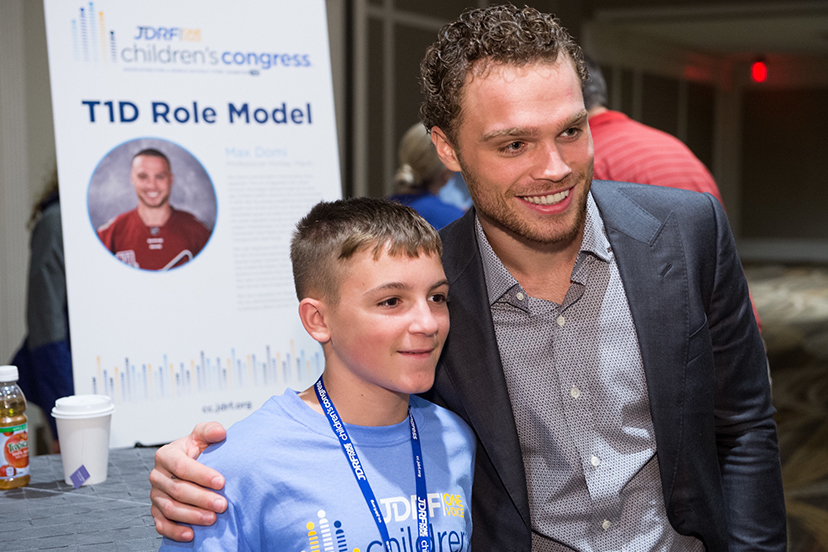
“Max, you have type 1 diabetes,” the doctor said.
“My mom and I looked at each other. For her, time stood still for a second as our entire future as a family shifted. But I had no clue what the diagnosis meant. So I said the first thing that came to mind.
“Can I still play hockey?”
Max Domi, National Hockey League star, was diagnosed with type 1 diabetes (T1D) when he was 12. His only thought at that very moment and to this day is about the sport that drives him: hockey.
While many may think of Max Domi as a T1D Champion because of his star status as an athlete, it is Max’s perseverance through personal and professional challenges that makes him such. Max has become a fierce competitor and quiet leader his teammates admire. Currently playing with the Montreal Canadians where he is a consistent top scorer, Max is also an ambassador and spokesperson for Breakthrough T1D Canada.
Released on October 28 (just in time for National Diabetes Awareness Month) Max’s book No Days Off shares his story of growing up and playing with T1D. The book is a warm and inspiring tale of how he has coped, dealt and won.
Max also will be playing throughout November with special limited-edition Breakthrough T1D-Max Domi hockey sticks. He will auction the sticks off after each game, with proceeds going to Breakthrough T1D to support youth, mental health and type 1 diabetes, and access to technology.
“I want to do whatever I can to make life better for Canadians living with type 1 diabetes,” Max said. “I hope youth read my book and feel that they are not alone, and diabetes does not have to stop you.”
Former captain from the Toronto Maple Leafs, Mats Sundin said, “No Days Off is a story that will inspire anyone, young or old, who’s struggled through adversity to follow their dreams.”
We celebrate Max as an example of a T1D Champion and invite you to share your story of being a T1D Champion on social media using the hashtag #T1DChampions.
About the Book:
All Max wanted was to be a normal kid, but suddenly, the simplest things—a game of basketball with friends, a family meal, a school field trip—were complicated with a thousand different considerations. Would people notice or make fun of him if he carried his blood-testing kit everywhere? Would his teammates think he was weak if his blood sugar went low at hockey practice? How much insulin did he need after a meal? And all the while, the fear of what might happen if things went wrong hung over his head. Max had to grow up quickly.
As he struggled to find his new normal, Max slowly began to realize that overcoming his disease demanded the same qualities that it took to be a hockey player—mental and physical toughness, maturity, and the love and care of family and friends. Bit by bit, he learned—sometimes the hard way—not just to control his diabetes, but to turn it into an advantage. If managing his disease was going to demand that Max be stronger, more prepared, and more disciplined than anyone else, then he wouldn’t just be good at those things: he’d be the best. He’d do whatever it took to move him closer to his dream of playing in the NHL.
Max is donating a portion of the book’s proceeds to Breakthrough T1D.
Read a recent news story about Max on the ice.
Read more about his book.